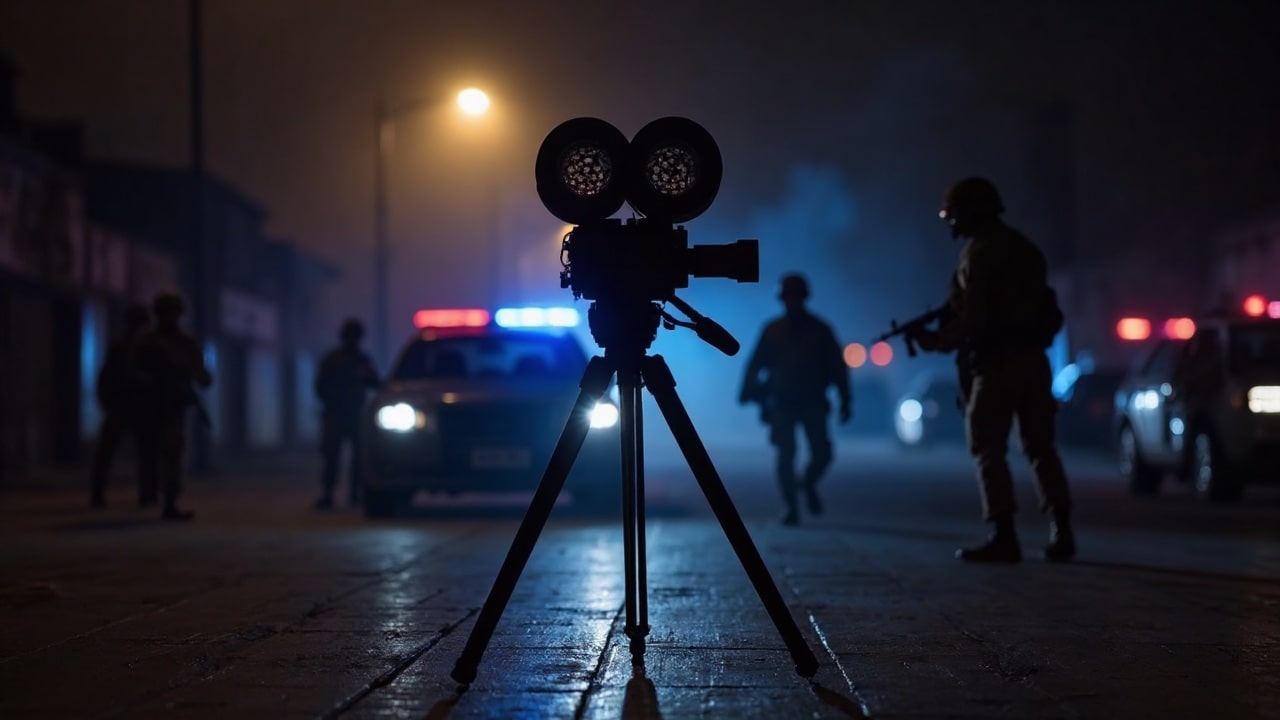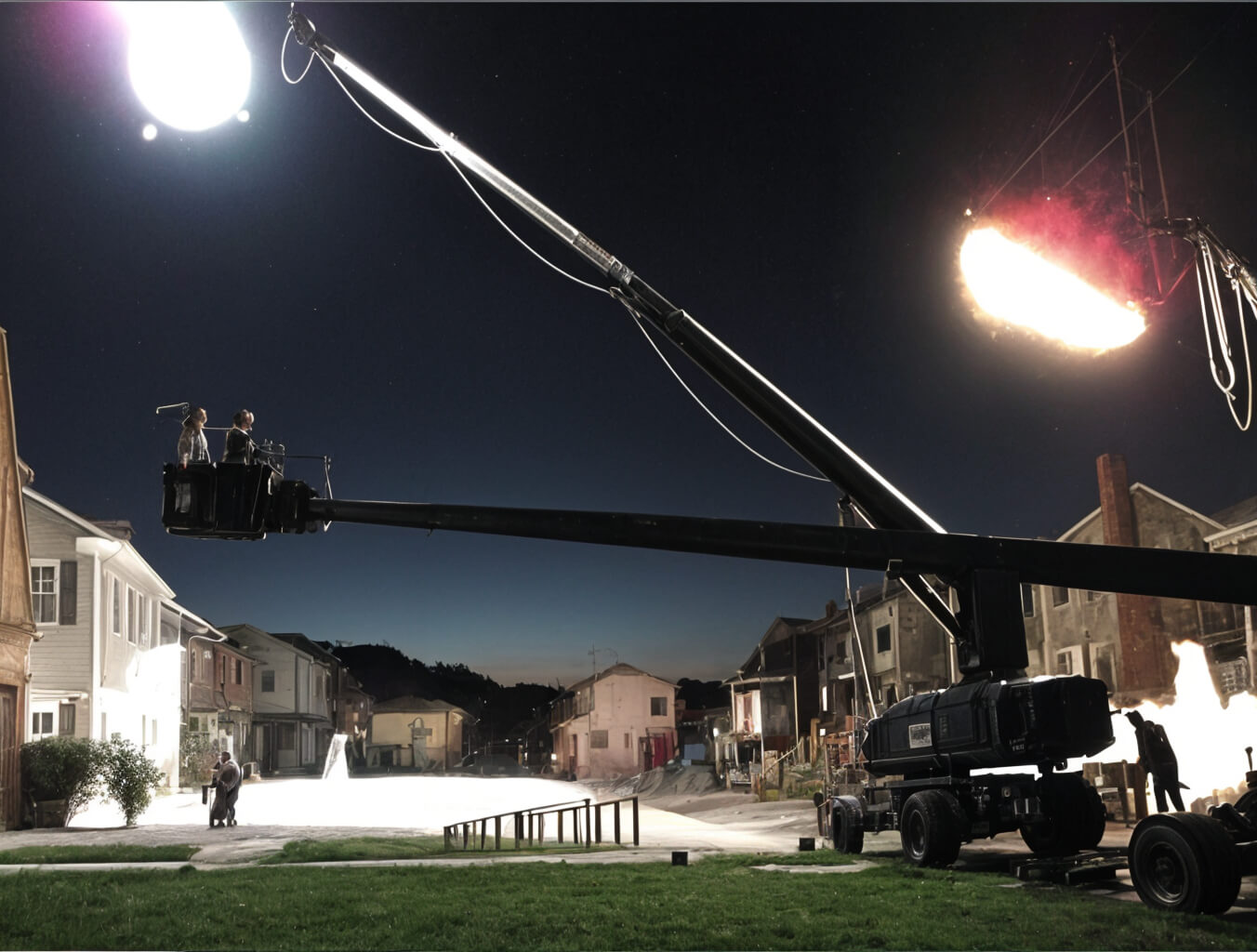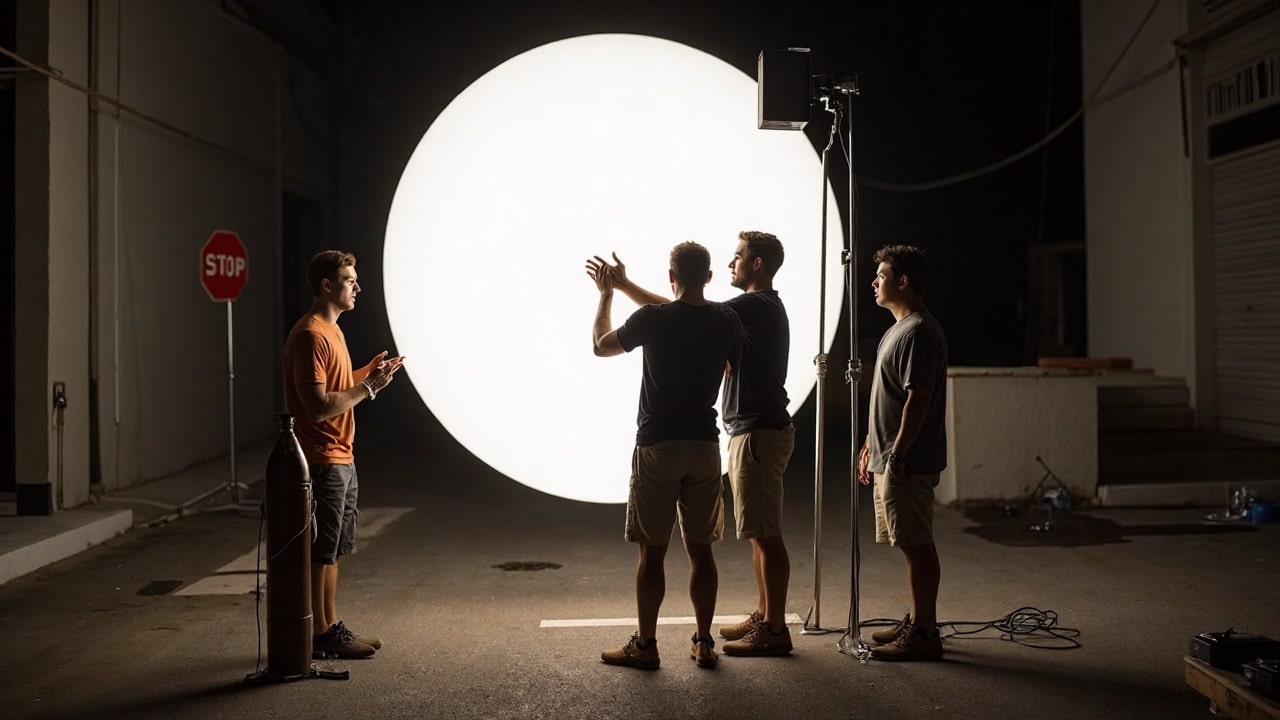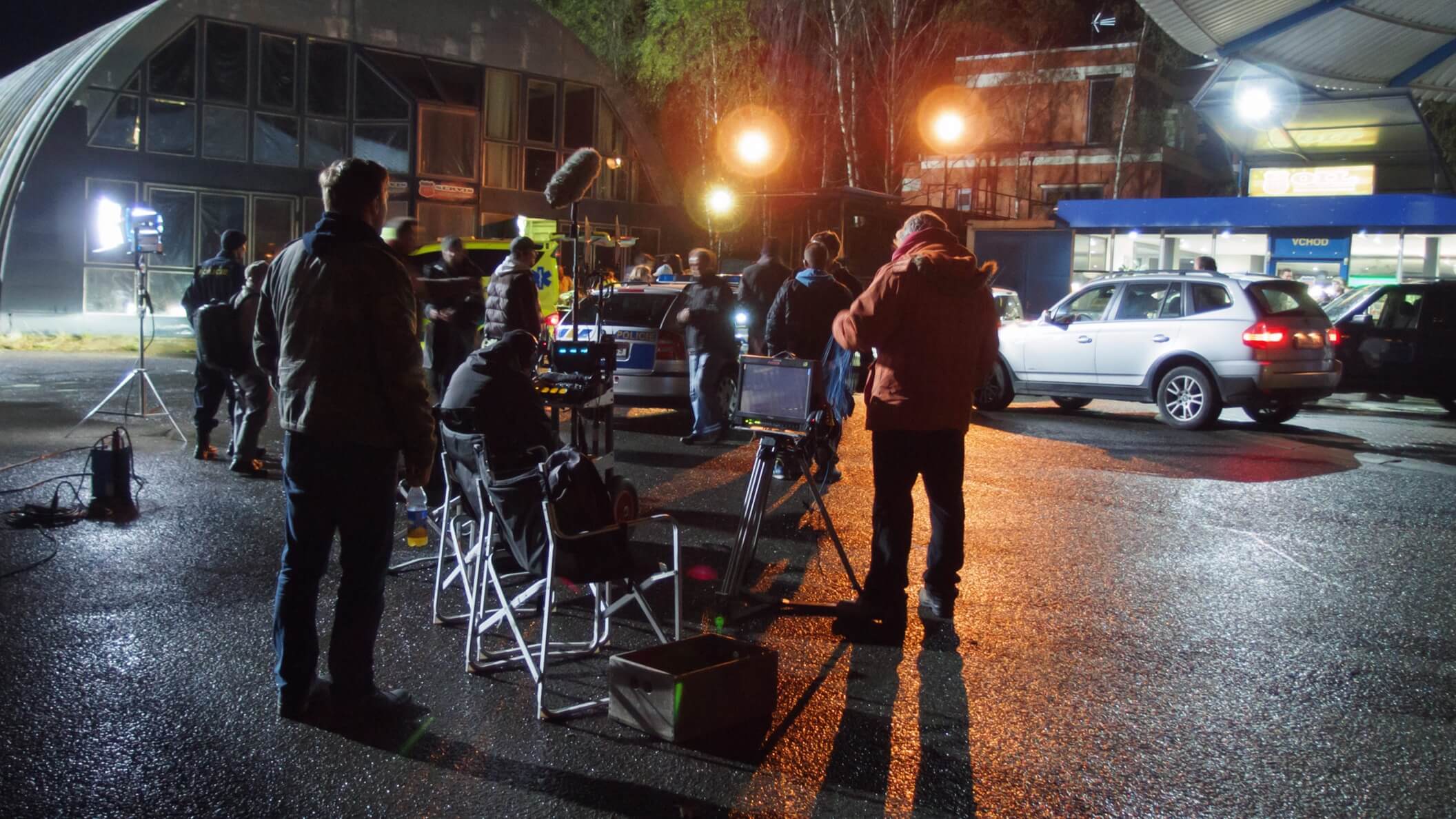Filmmaking is not for the faint-of-heart. It is only a matter of time before you work a project that truly tests the limits of your body; the dreaded night shoot. Whether you’re an AD or Producer, we’ll cover production hacks to help you better manage your set during an all-nighter.
1. Give Notice of an Upcoming Night Shoot.

How to Shoot a Movie at Night
It is extremely important that your cast and crew knows far in advance that a night shoot is scheduled. This is more than just common courtesy. It’s necessary to get people mentally and physically prepared to shift from their usual schedule. At a minimum, make sure that all cast and crew are informed of a night shoot at least 1 week in advance. You don’t need to know the exact call time but at least convey you’ll be filming at night.
2. Confirm Rate of Hired Hands.
Your makeup artist’s website may state $200/day, but it might omit they charge 2x for night shifts. If you’re working on a budget, it’s crucial to confirm pricing with everyone after they agree to film at night. If you’re recruiting PA’s, be prepared to offer a slightly higher rate given the hours.
3. Make Time in Advance for your Set-up Schedule.
It isn’t uncommon for key crew members to meet at the end of a day of shooting to map out the next day. On night shoots, no matter what you think you’re capable of, you’re going to want to go rest as soon as you’re done, so plan on hammering out your night shooting schedule well in advance.
4. Block out Extra Time for Lighting.

Budget Extra Time for Lighting Adjustments
The biggest and most cost-effective light you have access to, THE SUN, has just been removed from the equation. Lighting at night will inevitably take more time than it would during daylight hours. Your DP and Gaffer will be prepared for this. However, depending on the uniqueness of your setups, they may underestimate how much time it will really take.
RELATED POSTS
5. Secure Enough Power

Don’t Skimp on Power Needs
Again, your G/E department should be prepared for this, but if you’re night shooting in a remote location make sure that someone has secured a generator with the proper wattage for your lights. The G/E team may not factor in that base camp (craft services and production) will want power as well. Make sure that your generators can properly supply the needs of both teams for an entire night.
6. Bring Layers

Be Ready for Temperature Swings
Even the sunniest day will experience a significant temperature drop at night. This is especially true in any desert climate where icy winds come with the turf. If you’ll be shooting indoors and out, bring warm items you can take on/off easily. If you’ll be night shooting outdoors for hours at a time, don’t underestimate how cold it will get. It never hurts to bring beanies, gloves, scarves or anything Northface. If you don’t need it someone will.
7. Bring Flashlights.

Flashlights Are a Must
Outdoor hazards abound when night shooting in low visibility. Nowadays everyone has a smartphone flashlight, but they drain batteries quickly. Don’t use them, especially in remote locations where recharging is not an option. Instead, remind your crew to bring flashlights (and bring a few yourself) to increase visibility and minimize accidental tripping.
Pro Tip: Headlamps. Check Them Out.
We recommend picking up a good quality headlamp, especially for crew members who will be setting up expensive lighting equipment in the dark.
8. Keep Actors Happy.
Delivering strong performances consistently take-after-take is already a difficult task for actors. Now imagine doing it all night, on a broken sleep schedule, and potentially outdoors in the cold. There is a good chance they’ll be grumpier than usual or have extra needs.
Given the odd hours, routinely check-in to see if they have any special preferences (i.e. food, blankets, green room, etc.). Just as important: make sure you know exactly when you are going to need them and do not keep them on set any longer than required. The fastest way to upset an actor is to have them sitting around on set for hours when they could have been sleeping. Or even worse, have them wait around all night only to find out that you won’t be shooting their scenes after all. Do all you can to be considerate of their time as well.
Related Posts
9. The Absence of Distraction.
Less of a tip, more of a note: Unlike day shoots where crew members will feel compelled to pull out their phones to check their emails or Facebook feed during their downtime, when you’re shooting late at night there tends to be less to check online.
No emails will be coming in. Fewer people will be on Facebook. Unless your crew have a plethora of contacts overseas, there is very little need for them to check their phone recreationally.
This means you can count on your crew to be more present and active than usual during a night shoot (so long as the energy on set is positive and fulfilling).
Plan for this level of focus and use it to the production’s advantage!
10. Sleeping On Set.
Sometimes less experienced crew members with a moment of downtime may feel tempted to take a power nap. You can’t blame anyone for being tired or unaccustomed to working a night shoot, but sleeping on set is extremely unprofessional and disrespectful to those who are working nonstop.
First, nobody who is sleeping should do so in a visible area to actors or crew. There are enough reminders that it’s late. If a crew member is taking a nap, politely ask them to move somewhere out of visibility (like a car). Depending on what your production team decides, it may be advised to not allow it at all, but that is at the discretion of an individual set.
11. Food and Energy.
An entire article could cover this topic. Make sure that craft services have more snacks than usual, with plenty of healthy options. Sugar and caffeine may keep everyone buzzing for the first hour, but to have sustained energy through a night shoot, they’re going to need less junk food and more water.
At meal time, minimize carb-heavy entrees like pasta, rice, noodles or proteins with overly sweet sauces (sweet ribs, etc). Meals like this will contribute to food comas and sugar crashes. Stick to non-starchy vegetables and simple proteins.
Lastly, most bodies are not used eating heavy meals at late hours. Caution everyone to pace their meals and caffeine consumption. Although coffee is a must for night shooting, drinking small cups throughout the night is preferable to consuming an obscene amount all at once.
12. The Occasional Lurk.

Sometimes a Silent Observer
This one might seem a little comical, but every night shoot I’ve done has had some sort of trouble with outsiders encroaching upon the set. If a nearby bar closes at 2:30 in the morning, and some tipsy patrons (literally) stumble across your shoot, be prepared to handle some imposition.
Make sure all of your set is secure. Be on the lookout for onlookers; most will be harmless, some might give you trouble. If you’re having PA’s do security, keep them in pairs. More trouble is likely to turn up at night. You just never know who’s got funny ideas fueled by the late hour.
13. Driving out the Next Day

Heading Out the Following Morning
You might not immediately feel it at first, but after a long night shoot you are going to be exhausted and ready to hit the hay. Sadly, in most situations you still will need to drive yourself home.
Remember that the day isn’t over until you arrive home, and the only place you want to crash is your bed. As brutal as it may be, conserve enough energy just to get home. If you have another day ahead of you, go to sleep immediately. Everything else can wait and can be better solved after some rest.
14. Getting Back on a Regular Schedule

Back to the Usual Schedule
Unfortunately there is no universal life hack for overcoming an altered body clock. Some people are more adept to it than others.
One small suggestion that can only help: Vitamin D. Standing in sunlight after avoiding it for multiple days can be extremely rejuvenating. Do you body a favor and simply stand in the sun for a few minutes.
When trying to shift back to a regular sleep schedule, avoid looking at computer or phone screen before going to bed. Screens are proven to distort your body’s ability to register when its time to sleep.
Related Posts
Up Next
Wrapping Up
No matter what role you play on set, when it comes to a night shoot you’ll want to take extra measures to be healthy, prepared, and ready for any challenge. Once you’re there, you might not even feel any different, though it will catch up to you later!
Keep in good spirits about the whole thing, take necessary precautions, and remember that the end result will be worth the late hours. With a bit of prep, surviving a night shoot may be easier than you think.
Did we miss anything? Have any other tips or suggestions? Let us know in the comments below.

